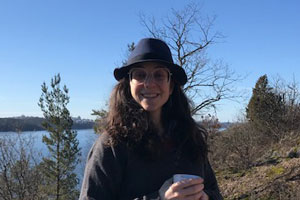-
Share this page
Maria Mancilla Garcia
Maria holds the « Environmental Humanities » Chair at ULB. She works on power dynamics in environmental governance and is particulalry interested in the diversity of socio-environmental relations, including how these are conceptualized.

Description
Maria holds the « Environmental Humanities » Chair at ULB. She works on power dynamics in environmental governance and is particulalry interested in the diversity of socio-environmental relations, including how these are conceptualized. She gives an interdisciplinary course on the diverse theoretical frameworks that have been used to make sense of socio-environmental dynamics and draws attention to the implications these have on management. She is inserted in several pluridisciplinary teams both at ULB and with partners based in other universities.
Fields of research
My research is at the interface of political ecology and environmental governance. Having trained in Development Studies, I am particularly interested in inclusion and exclusion of marginalized people in environmental governance. I specifically work from a process-relational standpoint, as this allows me to overcome dualisms such as nature/culture or conflict/cooperation. When it comes to methods, I combine consacrated social science research methods – such as network analysis, interviews, or discourse analysis – with newer approaches – including community theatre. I have worked on water governance for more than ten years but I have recently also become interested in small-scale fisheries and climate change.
- Enseignement et activités
- Research projects
- FoRel - Forum theatre to enhance joint agency in Kenya and Mozambique: Towards relational understandings of climate change.
Coastal communities in East Africa face multiple challenges that threaten their well-being, perpetuate inequalities and lead to unsustainable management of natural resources. This project will explore which relationships and daily practices, among the many that actors are embedded in, can be conceived of as tools to enhance joint agency for climate change adaptation. This project seeks to better understand how obstacles to climate change adaptation are deeply ingrained in social-ecological networks. Indeed, the project will investigate the factors perpetuating inequalities and unsustainable exploitation of coastal resources and in which ways climate change is intertwined with those. Additionally, as an action-research project, it seeks to enhance a relational conception of social-ecological agency through community forum theatre in selected communities in Kenya and Mozambique.
XPaths
XPaths, which is short for Science in action: Intersecting pathways to the SDGs across scales in the drylands, is a collaborative research project that explores how to create inclusive pathways that will lead to achieving the Sustainable Development Goals (SDGs). More specifically, XPaths aims to better understand the barriers and leverage points that will either push us further away or closer to reaching SDGs. XPaths takes a broad perspective - bridging local to global scales, contrasting narratives about desired futures. - Publications
-
- Preiser, Rika, Maja Schlüter, Reinette Biggs, María Mancilla García, Jamila Haider, Tilman Hertz, and Louis Klein. 2021. “Complexity-Based Social-Ecological Systems Research: Philosophical Foundations and Practical Implications.” In The Routledge Handbook of Research Methods for Social-Ecological Systems, 27–46. London: Routledge. https://doi.org/10.4324/9781003021339-3.
- Bodin, Örjan, María Mancilla García, and Garry Robins. 2020. “Reconciling Conflict and Cooperation in Environmental Governance: A Social Network Perspective”. Annual Review of Environment and Resources 45.
- Mancilla García, María, Tilman Hertz, Maja Schlüter, Rika Preiser and Minka Woermann. 2020. “Adopting process-relational perspectives to tackle the challenges of social-ecological systems research”. Ecology and Society 25(1): 29.
- Bodin, Örjan, Steven Alexander, Jacopo Baggio, Michele Barnes, Ramiro Berardo, Graeme Cumming, Laura Dee, Manuel Fischer, Alexandra Fischer, María Mancilla García, Angela Guerrero, Jacob Hileman, Karin Ingold, Petr Matous, Tiffany Morrison, Daniel Nohrstedt, Jeremy Pittman, Garry Robins, Jesse Sayles. 2019. “Improving network approaches to the study of complex social-ecological interdependencies”. Nature Sustainability 2(7): 551-559
- Mancilla García, María and Örjan Bodin. 2019. “Participation and technical knowledge in water basin councils in Peru and Brazil: an analysis of multifaceted effects.” Global Environmental Change 55 (2019): 139-148.
Tél : (+32) 2 650 21 52
Bureau : DB.6.250
Faculté des Sciences
Campus du Solbosch - CP 130/03
Avenue F.D. Roosevelt, 50 1050 Bruxelles
Updated on November 26, 2024